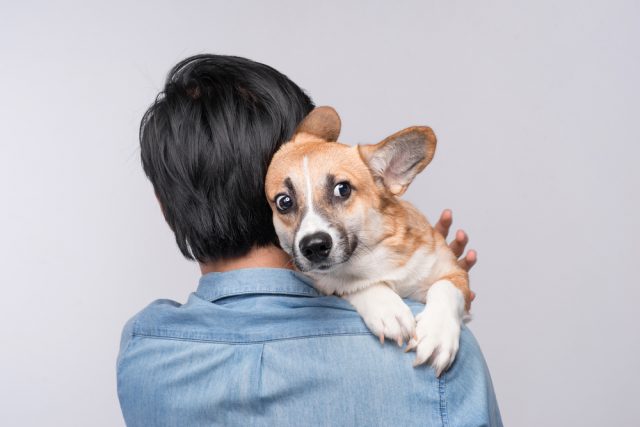Have you ever wondered if your rescue dog was abused before they became part of your family? Maybe they jump at every small sound or cower if you raise your hand or pick up the newspaper.
While it’s usually impossible to know for sure what sort of situation your dog lived in previously, there are some signs that could indicate a history of abuse.

Here are 5 signs that your dog may have come from an abusive home.
#1 – Physical signs
If your dog was too skinny or had healing wounds when you adopted them, it’s pretty obvious that your dog was neglected in their previous home, but some symptoms are more subtle. Nails that are longer than they should be, fur that doesn’t seem very healthy, walking with an unusual gait, and having places on their body that they don’t like to be touched are all signs that they may have been abused.
#2 – Food aggression
Does your dog scarf their food down so quickly that you wonder if they’re actually tasting it? Do they refuse to walk away from their bowl in the middle of eating? Do they growl or snap at you or other dogs for coming too close when they’re eating? These may all be signs that your dog grew up in a situation where they didn’t have a reliable source of food. Food aggression can be very dangerous and should be discussed with a trainer or veterinarian immediately.
#3 – Being extra clingy
If your dog insists on clinging to your side at all times, even when you need to use the restroom, they may have had an unstable puppyhood. This may be more prevalent in dogs that have been rehomed one or more times. Dogs that are extra clingy may have or may develop severe separation anxiety to the point that they whine, howl, become destructive, or urinate or defecate in the house as soon as you leave. There are a number of methods for dealing with separation anxiety that a trainer can help you with, and a comfort cuddler can help soothe your dog when you must leave the house.
#4 – Submission
While some dogs are naturally more submissive than others, an overly submissive dog may be displaying signs of abuse. Some signs of extreme submission include rolling over with tail tucked when approached, cowering, “smiling,” and lying down or cowering while urinating. Scolding a dog who is urinating submissively is likely to make the problem worse, so you should talk to a trainer to discuss ways to make your dog feel more comfortable with you in your home.
#5 – Fear or aggression
Many dogs will have one or two fears and may become aggressive in certain circumstances. Dogs that were abused tend to be afraid of everything and may be unpredictably aggressive. These dogs may need medication on top of work with a dog trainer to become more comfortable in the world.
Keep in mind that some dogs are just naturally more timid than others, so if you’ve been the only owner of your dog since they were a puppy, that doesn’t mean you’ve somehow neglected them if they display any of these signs.


 Toledo, United States.
Toledo, United States.